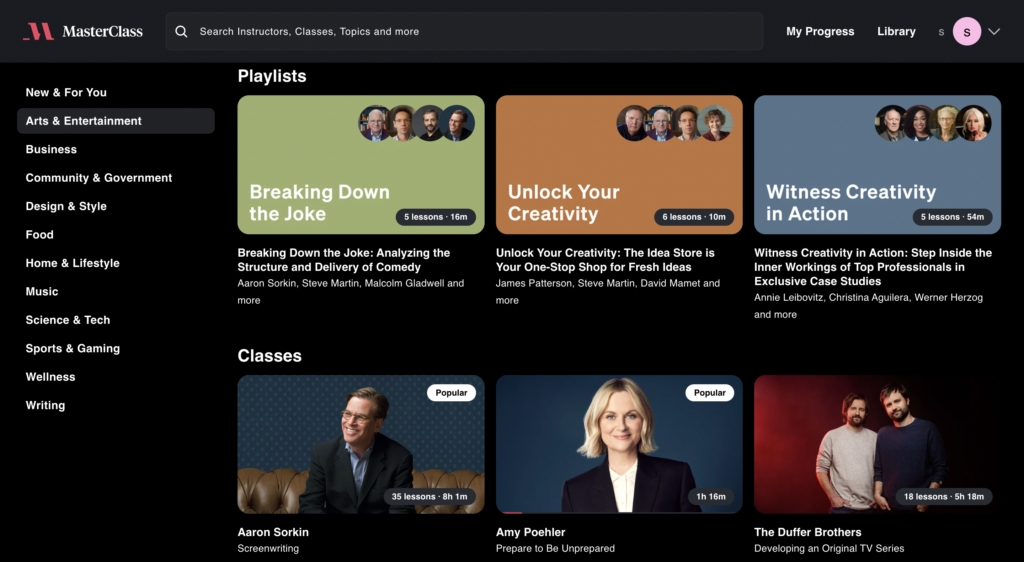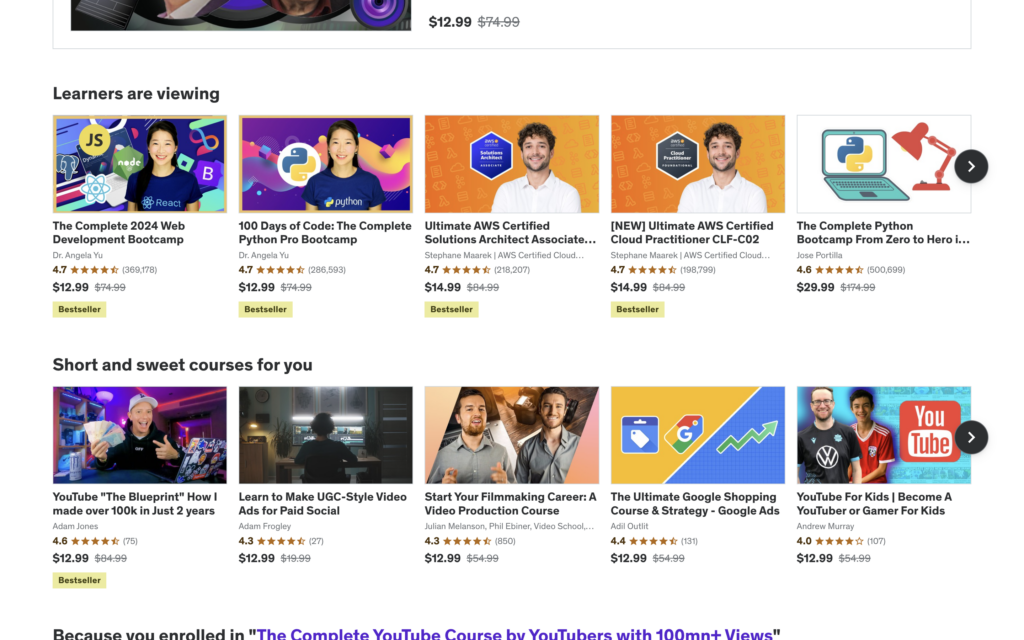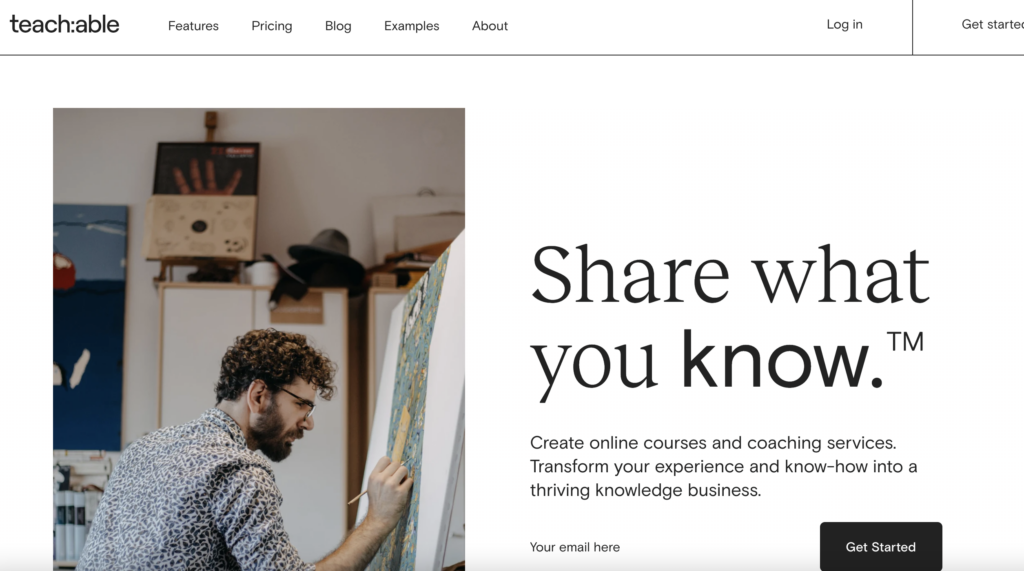A Brief Overview of Skillshare
Skillshare emerges as a vibrant hub for online learning, catering especially to the creative and the curious. It’s a platform where expertise meets enthusiasm, with thousands of classes spanning across a multitude of disciplines like illustration, design, photography, video, and freelancing, to name a few. Skillshare stands out for its community-driven approach, where learning is not just about watching videos in isolation but about engaging in a project-based and peer-to-peer learning environment. This dynamic space is not only for students but also welcomes professionals who wish to impart knowledge, making the teaching process accessible and community-centric.
The Importance of Finding the Right Online Learning Platform
In the ever-evolving landscape of education, the importance of finding an online learning platform that aligns with one’s goals cannot be overstated. In an age where the world is your classroom, platforms like Skillshare enable continuous personal and professional growth from the comfort of one’s own space. Yet, as diverse as the needs of learners are, so are the offerings of various platforms. From the breadth and depth of content to the structure of learning experiences, and the community it fosters, each platform carves its niche in the digital learning ecosystem. For learners, it’s crucial to choose a platform that not only provides high-quality content but also fits their learning style, offers the right tools and support, and perhaps most importantly, aligns with their long-term learning and career objectives. Whether it’s to upskill for a job, satiate a hobby, or feed a passion, the right platform is a gateway to new possibilities and an investment in one’s future.
What Makes a Great Online Learning Platform?
When assessing the landscape of online learning, there are key features that distinguish a great platform from the multitude:
Comprehensive Content Library: A robust selection of courses covering a spectrum of subjects allows learners to explore new skills and deepen existing ones. Skillshare thrives here, with a library rich in creative content, spanning from animation to entrepreneurship.
Quality of Instructors: The best platforms attract knowledgeable and passionate instructors who are leaders in their field. Skillshare, for example, boasts industry experts like YouTuber Marques Brownlee and Photographer Amelie Satzger among its ranks.
Interactive Learning: A platform should foster engagement through interactive features like project-based learning, which Skillshare emphasizes to enhance the hands-on experience.
Accessible Learning Paths: With structured sequences of courses aimed at skill progression, learners can follow a comprehensive path from novice to expert.
Community and Networking: The opportunity to interact with peers and instructors enriches the learning experience. Skillshare’s community aspect encourages feedback and collaborative learning.
Flexibility and Accessibility: Learning on one’s own terms, with on-demand access to classes, is crucial. Skillshare offers this flexibility, allowing learners to engage with content when it suits them.
Support and Resources: Adequate support structures, including customer service and technical help, ensure a seamless learning experience. While Skillshare has faced some criticism for its customer support, it remains an area for potential growth.
Affordability and Value: Pricing models that offer options and accessibility to a wide audience are essential. Skillshare’s model includes free trials and a choice between monthly and annual subscriptions.
Certificates and Accreditation: While not provided by Skillshare, some learners seek platforms that offer formal recognition of their learning for professional development.
User Experience: A clean, intuitive interface makes navigation and learning more enjoyable and efficient. Skillshare’s user-friendly design facilitates easy access to its content and community features.
How Skillshare Sets a Standard
Skillshare has carved out a niche as a go-to platform for creative learning by excelling in several of these areas. It stands out for its extensive library of creative courses, focus on project-based learning, and access to industry experts. The platform sets a standard in informal creative education, making learning both accessible and enjoyable for a global community of creatives. However, it’s important to note that while Skillshare shines in these aspects, the absence of formal accreditation and varied quality of courses may prompt users to seek alternatives, especially those looking for a more traditional educational experience or specific learning outcomes.
While Skillshare sets the bar high in certain aspects of online learning, individuals must evaluate what features align best with their personal and professional growth goals when choosing the right platform for their needs.

In-Depth Analysis of Top Skillshare Alternatives
Let’s explore several Skillshare alternatives, offering a range of features from comprehensive course offerings to unique selling points that set them apart.
Alternative #1: MasterClass

Overview and Unique Selling Proposition (USP):
MasterClass stands out for its high-caliber instructors—renowned experts in their fields—and its high production value. It’s a platform where you can learn cooking from Gordon Ramsay or writing from Dan Brown.
Course Structure and Content Quality:
Courses on MasterClass are well-produced, delivering an immersive and engaging educational experience.
Pricing and Plans:
MasterClass offers subscription plans comparable to Skillshare. Bundling with friends or family can provide savings.
User Experience:
Users enjoy a mix of on-demand MasterClasses and live project-based sessions within a community of students.
Pros and Cons:
Pros include learning from top-tier professionals, a wide variety of courses, and the option to participate in classes with a group. A major con is the absence of free classes and certificates of completion.
Alternative #2: Udemy

Overview and Unique Selling Proposition (USP):
Udemy boasts a vast marketplace, offering a wide range of content types and a system that encourages user ratings and engagement.
Course Structure and Content Quality:
Instructors on Udemy can create varied content from videos to quizzes, enhancing the learning experience.
Pricing and Plans:
Udemy allows users to purchase courses individually, providing flexibility in content consumption.
User Experience:
Udemy is known for its easy navigation but has limitations on its mobile app for instructors.
Pros and Cons:
The main advantage of Udemy is its large user base and variety of courses. However, the algorithm may not favor all courses equally, making visibility a challenge for new instructors.
Alternative #3: Coursera

Overview and Unique Selling Proposition (USP):
Coursera partners with top universities to offer a wide range of courses and specializations, many of which can lead to professional certificates or degrees.
Course Structure and Content Quality:
Courses on Coursera are academic in nature, with structured learning paths provided by experts in the field.
Pricing and Plans:
Many of Coursera’s courses can be audited for free, and users can pay for certification later.
User Experience:
Coursera’s platform is user-friendly and provides a more traditional educational experience.
Pros and Cons:
Coursera’s pros include high-quality academic content and the potential for accredited certification. However, some users may find the pricing structure for certificates and degrees confusing.
Alternative #4: Teachable

Overview and Unique Selling Proposition (USP):
Teachable is a beginner-friendly platform that allows creators to build and sell online courses with ease, using a variety of multimedia content.
Course Structure and Content Quality:
Creators can use Teachable to deliver pre-recorded video content supplemented by resources like live coaching sessions and text materials.
Pricing and Plans:
The platform offers customizable pricing options with the ability for creators to set their domain names and use multimedia editing tools.
User Experience:
The user interface is streamlined, although the mobile app offers limited instructor functionality.
Pros and Cons:
Teachable is praised for its ease of use and multimedia capabilities but lacks advanced community-building tools, and content discovery in its marketplace can be challenging.
These platforms each offer unique features that could make them a better fit depending on your specific needs. MasterClass excels in high-quality production and celebrity instructors, Udemy in its vast marketplace, Coursera in accredited academic content, and Teachable in its user-friendly course creation tools. Consider what’s most important for your learning goals or content creation when choosing the right platform.
Comparative Analysis
When comparing Skillshare to its alternatives, a few key aspects come into focus: the features each platform offers, the value for money, and the strength and nature of their respective communities and networks. Let’s break these down:
Side-by-Side Feature Comparison
Course Diversity: Skillshare has a wide range of creative classes. MasterClass offers classes from world-renowned experts, while Coursera focuses on academic and professional development courses with accreditations. Udemy provides a large marketplace with diverse subjects, and Teachable excels in its multimedia course creation capabilities.
Learning Experience: MasterClass stands out with its high production values, creating a cinematic learning experience. Coursera’s learning experience is similar to traditional education, and Udemy offers user ratings to help navigate course quality.
Content Creation: Teachable is user-friendly for course creators, with a powerful multimedia editing suite. Udemy allows a wide range of content types but has a crowded marketplace that may impact course visibility.
Value for Money Analysis
When examining the value for money of each platform, it’s important to consider the cost in relation to the number of courses available, access to content, and any additional benefits.
Skillshare Pricing:
Monthly: $32 USD
Annual: $168 USD, which breaks down to approximately $14 per month, providing significant savings over the monthly rate.
Skillshare’s annual plan offers a cost-effective way to access its entire library, which is particularly valuable for those committed to long-term learning.
Udemy Pricing:
Courses are priced individually, typically ranging from $10 to $200 USD.
With Udemy, users pay per course, which could be beneficial for those looking to focus on specific subjects without the need for a subscription.
MasterClass Pricing:
Individual: $120 USD per year (about $10 per month).
Duo: $180 USD per year (about $15 per month, two accounts).
Family: $240 USD per year (about $20 per month, six accounts).
MasterClass offers a unique proposition with access to celebrity-taught classes, with pricing tiers that cater to individual or family needs, making it a good option for shared learning experiences.
Coursera Pricing:
Annual: $399 USD
Monthly: $59 USD
Free Trial: 7 days
Refund Policy: 14 days
Courses: 7,000+
Coursera’s subscription is on the higher end, but it provides access to a wide range of professionally-developed courses and includes accredited certificates, which adds considerable value for those seeking formal recognition of their learning.
Given these pricing structures, the best value for money depends on individual learning needs and goals. Skillshare is great for continuous learning across a wide range of creative subjects. Udemy offers a pay-as-you-go model that may suit those with a focus on specific skills. MasterClass provides premium content for those looking to learn from industry leaders in a high-quality, story-driven format. Coursera stands out for those seeking academic learning and professional development with certifications from recognized institutions.
Community and Network Comparison
Interaction and Engagement: Skillshare’s platform allows for student projects and community interaction, which fosters peer-to-peer engagement. MasterClass doesn’t offer certificates, but it creates a community through project-led sessions. Coursera offers community forums and peer-reviewed assignments for interaction. Udemy’s rating system and Q&A sections encourage community engagement.
Support for Creators: Teachable provides a comprehensive solution for creators to build and market their courses, though it lacks advanced community features. Udemy supports its instructors with a range of content creation tools but poses challenges with course visibility due to algorithm prioritization.
Networking Opportunities: Platforms like Coursera and MasterClass offer fewer networking opportunities directly through the platform, focusing more on the learning experience, whereas Skillshare and Udemy provide more options for community building among students and instructors.
In conclusion, each platform has its strengths and caters to different types of learners and educators. The choice between them depends on individual learning goals, the desire for community interaction, the need for formal accreditation, and whether one is a learner or a content creator. These insights should guide users in selecting the platform that best suits their needs.
Choosing the Right Platform for You
When it comes to selecting an online learning platform that aligns with your educational ambitions, here are some key factors to ponder and tips to ensure you’re making the best choice:
Factors to Consider Based on Learning Goals
Type of Content: Are you looking for creative skills, academic knowledge, or professional development? Platforms like Skillshare are renowned for creative content, while Coursera offers courses with academic rigor and certification.
Instructor Expertise: Consider whether learning from top professionals or celebrities, as seen on MasterClass, is crucial to you or whether you prefer the academic expertise found on platforms like Coursera.
Learning Style: Do you prefer self-paced learning with pre-recorded lessons, or are live classes and interactive sessions more engaging for you? Some platforms offer more in terms of live interaction and community engagement.
Certification Requirement: If you need a certificate for career advancement or personal satisfaction, platforms like Coursera may be more suitable than those like Skillshare or MasterClass, which don’t offer formal credentials.
Budget: Determine what you’re willing to spend and whether you prefer a subscription model, a one-time course fee, or free content with optional paid certification.
Tips on Making the Best Choice
- Explore Free Trials: Take advantage of free trials or audit options to get a feel for the platform’s interface, content quality, and learning style.
- Read Reviews: Look for user feedback and reviews to understand the experiences of other learners, which can provide valuable insight into the reliability and quality of the platform.
- Check for Updates: Ensure that the platform regularly updates its courses to keep up with the latest industry standards and practices, especially for fields that change rapidly.
- Consider Community Aspects: A platform with a strong community can enhance learning through discussion, networking, and support.
- Look at the Long-Term: Think about your long-term goals and choose a platform that offers courses that can grow with you as your skills and interests develop.
Making the right choice requires a balance of practical considerations and personal preferences. By weighing the features against your individual needs and desired outcomes, you can select a platform that not only fits your immediate learning requirements but also supports your journey of continuous education and skill development.
Conclusion
After a thorough exploration of Skillshare and its alternatives, it’s clear that each platform carries unique advantages catering to different learning preferences, goals, and budgets.
Recap of the Alternatives:
Skillshare: Ideal for those seeking a diverse range of creative courses with a project-based learning approach.
Udemy: Offers a vast marketplace with individual course purchases, suitable for those focusing on specific topics.
MasterClass: For those who prefer to learn from celebrity experts with high production value.
Coursera: Academically oriented with a wide range of professional development courses that offer certification.
Teachable: A user-friendly platform for beginners in online course creation, emphasizing multimedia content.
Final Recommendations Based on Specific Needs:
- For Creativity and Casual Learning: Skillshare is recommended for its affordable subscription model and extensive library of creative classes.
- For Professional Development: Coursera is the go-to platform for its academic partnerships and certification programs.
- For Expert-Led Learning: MasterClass offers an unparalleled experience with insights from leaders in various fields.
- For Skill-Specific Learning Without Subscription: Udemy’s pay-per-course model allows you to pay for only what you want to learn.
- For Aspiring Course Creators: Teachable provides robust tools for creators to launch and market their courses with ease.
Choosing the right platform is a personal decision that should align with your learning style, professional objectives, and the type of community you want to engage with. By considering these factors, you’ll be able to invest in a platform that not only suits your educational needs but also enhances your lifelong learning journey.

